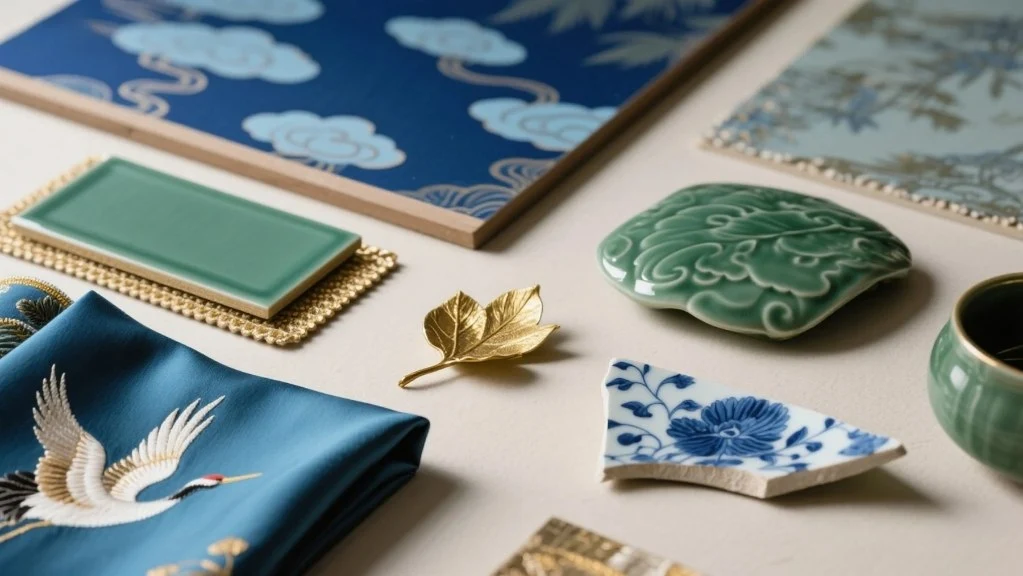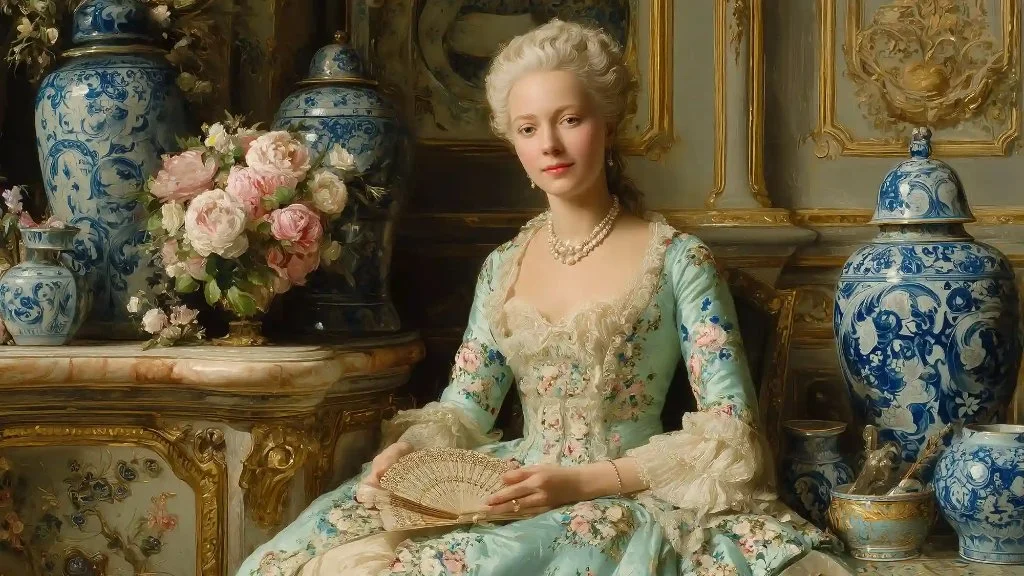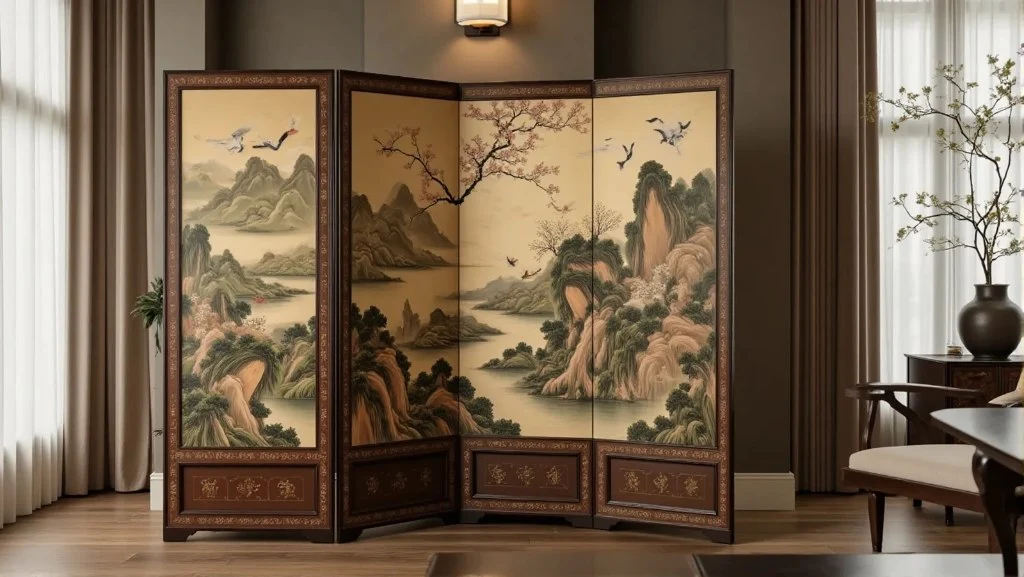What Is Chinoiserie?
Once upon a time in the 17th century, Europe fell head over heels in love with a fantasy—a fantasy rooted in the East. Delicate florals, exotic birds, mystical pagodas, and whimsical dragons—this wasn't just art; it was Chinoiserie. Derived from the French word "chinois", meaning “Chinese,” Chinoiserie refers to a European interpretation of East Asian aesthetics, particularly from China, Japan, and other parts of Asia.
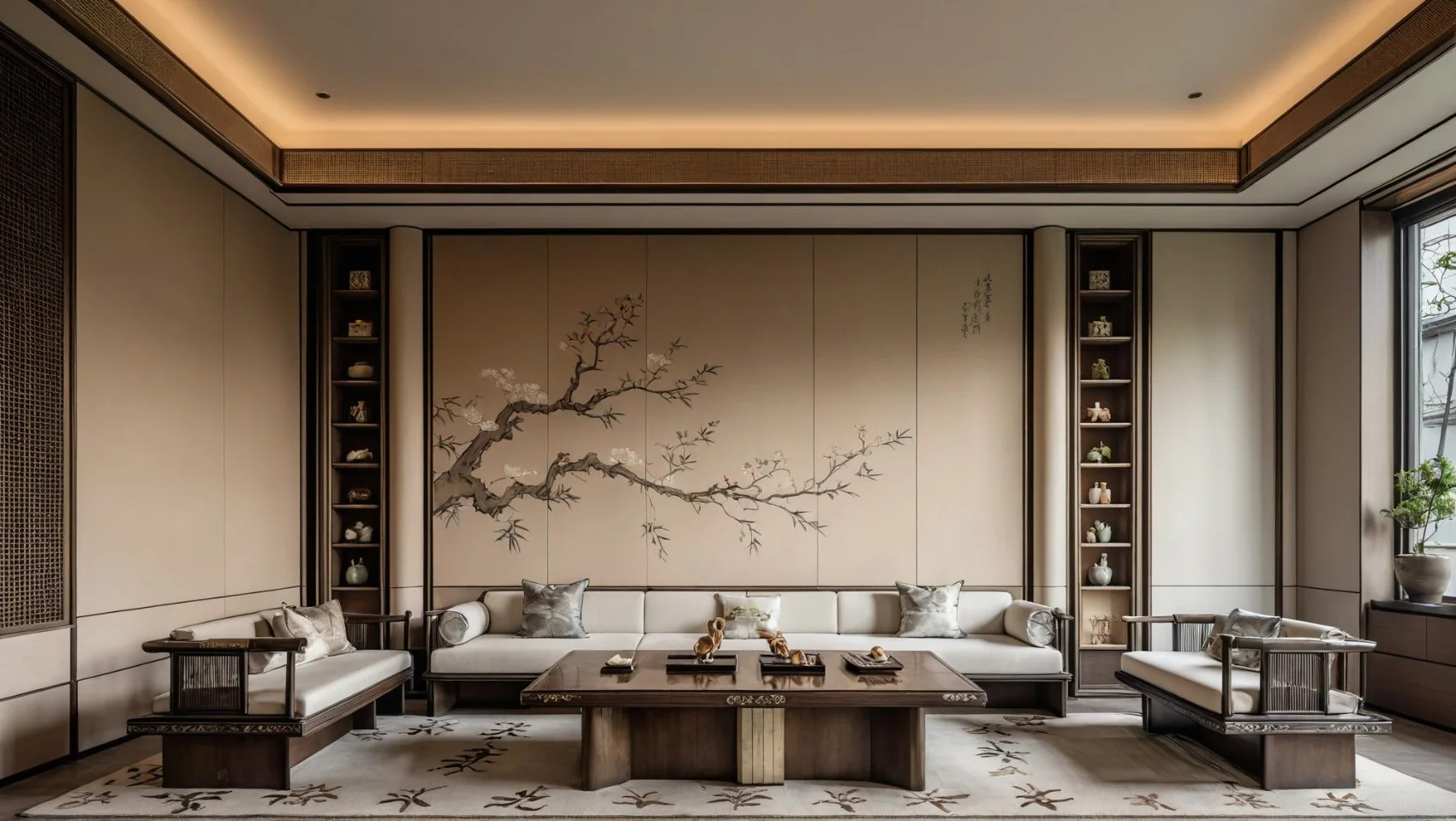 CHINOISERIOE-INSPIRED INTERIOR WITH LAYERED TEXTURES
CHINOISERIOE-INSPIRED INTERIOR WITH LAYERED TEXTURES
But don't be fooled—this style isn't about historical accuracy. It’s about romance, escapism, and a visual journey to a world reimagined. Today, Chinoiserie is enjoying a vibrant comeback, gracing everything from high-end wallpapers to thrifted porcelain vases. So what’s the big deal?
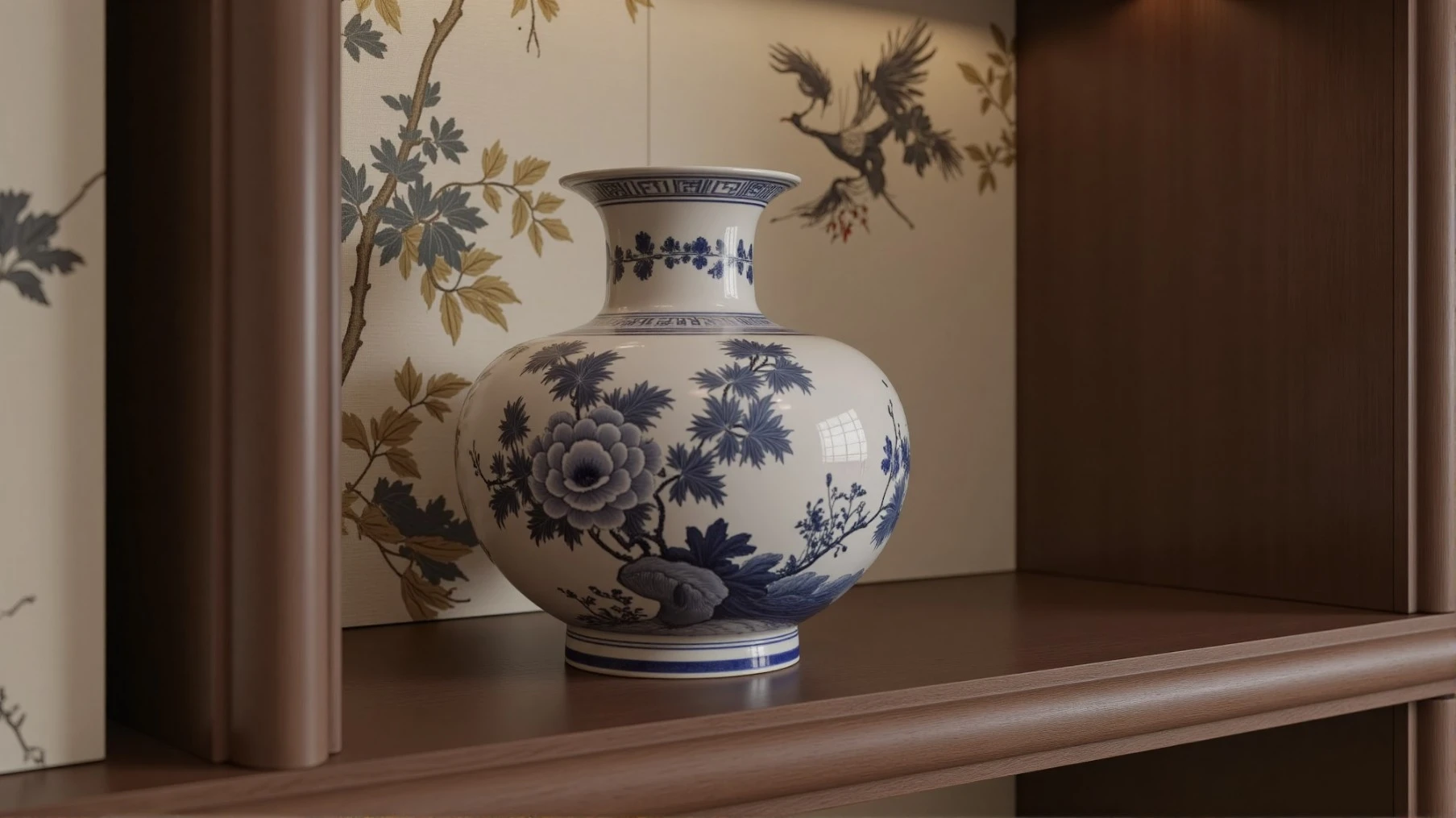 BULE AND WHITE PORCELAIN CHINOISERIE VASE ON DISPLAY
BULE AND WHITE PORCELAIN CHINOISERIE VASE ON DISPLAY
In this blog, we’ll dive into the meaning, patterns, and design ideas that make Chinoiserie such a fascinating and enduring trend.
1. Chinoiserie Meaning & Origins
Let’s get one thing straight: Chinoiserie is not Chinese design. It’s a stylized Western interpretation of Asian art, created to capture the mystery and splendor of the East. Emerging during the late 17th century in France and England, Chinoiserie became a visual language that blended Eastern motifs with Rococo flourish.
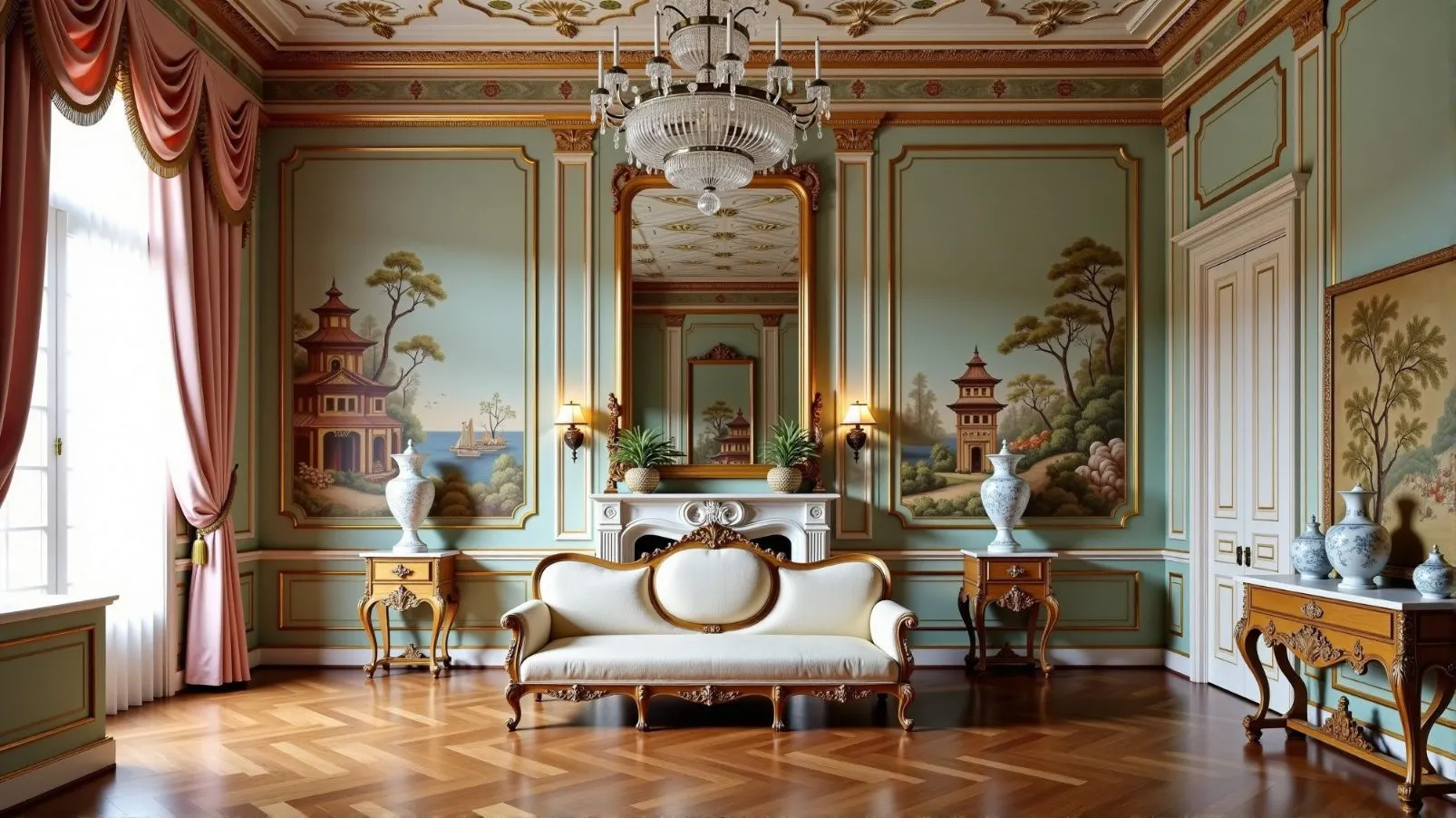 EUROPEAN PALACE ROOM WITH CHINOISERIE WALL PANELS
EUROPEAN PALACE ROOM WITH CHINOISERIE WALL PANELS
The Definition of Chinoiserie
Chinoiserie is defined as a decorative style characterized by the use of Chinese motifs and techniques, especially in furniture, textiles, and wall art. Common themes include:
- Nature-inspired elements like cherry blossoms, cranes, and willows
- Architectural motifs such as pagodas and latticework
- Imaginary scenes of imperial life, often idealized
A Word About Pronunciation
Wondering how to pronounce chinoiserie? It’s /ˌʃiː.nwɑːˈzə.ri/ (sheen-wah-zuh-ree). Don’t stress over it—we've all butchered it at some point.
2. Popular Chinoiserie Patterns
From painted silks to porcelain platters, chinoiserie patterns are instantly recognizable for their intricate storytelling. These motifs go beyond aesthetics; they carry symbolism rooted in Eastern philosophy.
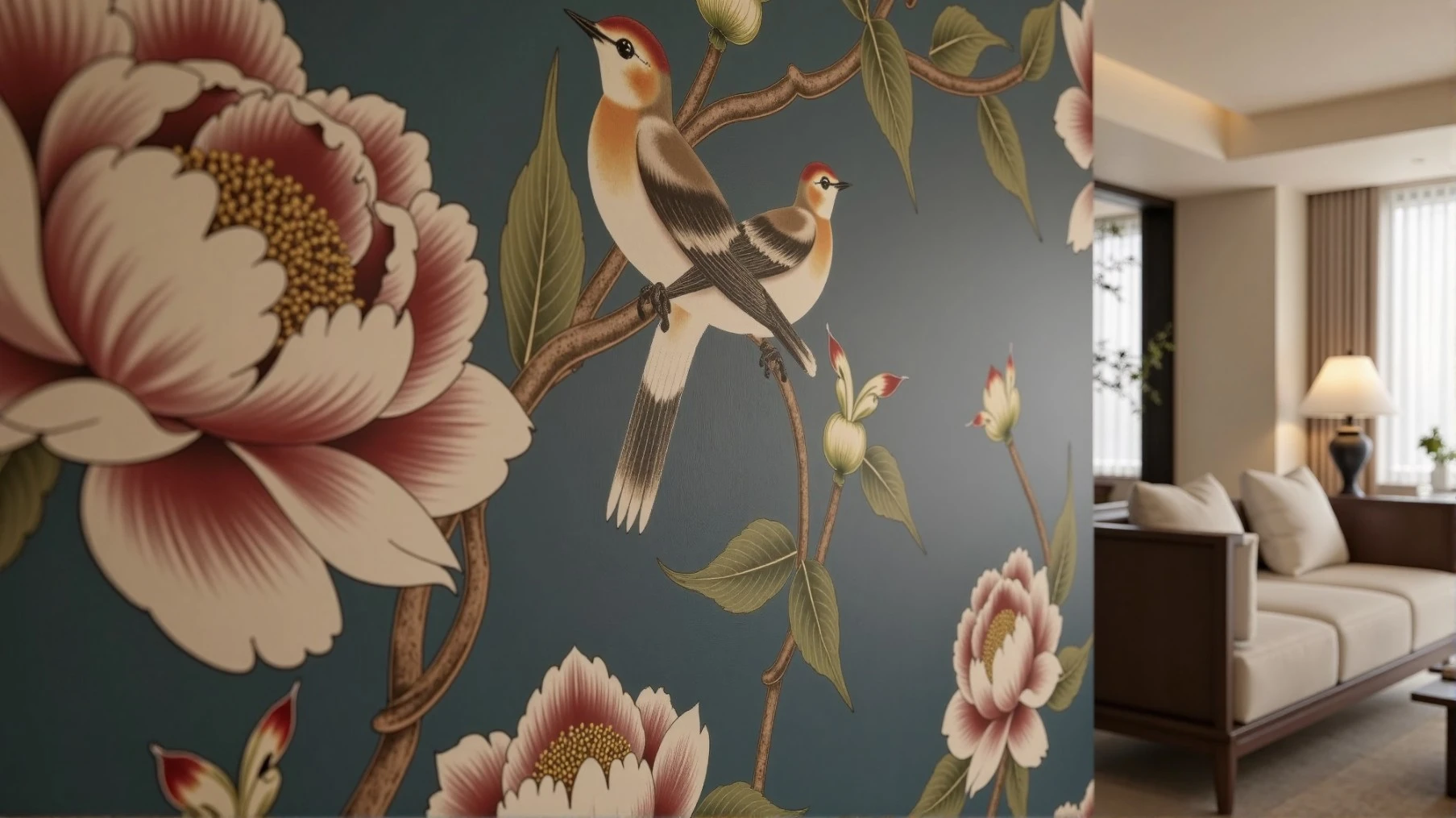 CLOSE-UP OF CHINOISERIE PATTERN WITH BIRDS AND FLORALS
CLOSE-UP OF CHINOISERIE PATTERN WITH BIRDS AND FLORALS
Floral & Fauna
Whether it’s hand-painted wallpaper or embroidered bedding, flora and fauna take center stage in Chinoiserie design:
- Peonies: Symbolize wealth and prosperity
- Cranes: Represent longevity
- Butterflies: Denote transformation and grace
These motifs are often arranged in elaborate scenic compositions that feel more like scroll paintings than mere decoration.
Architectural & Geometric Forms
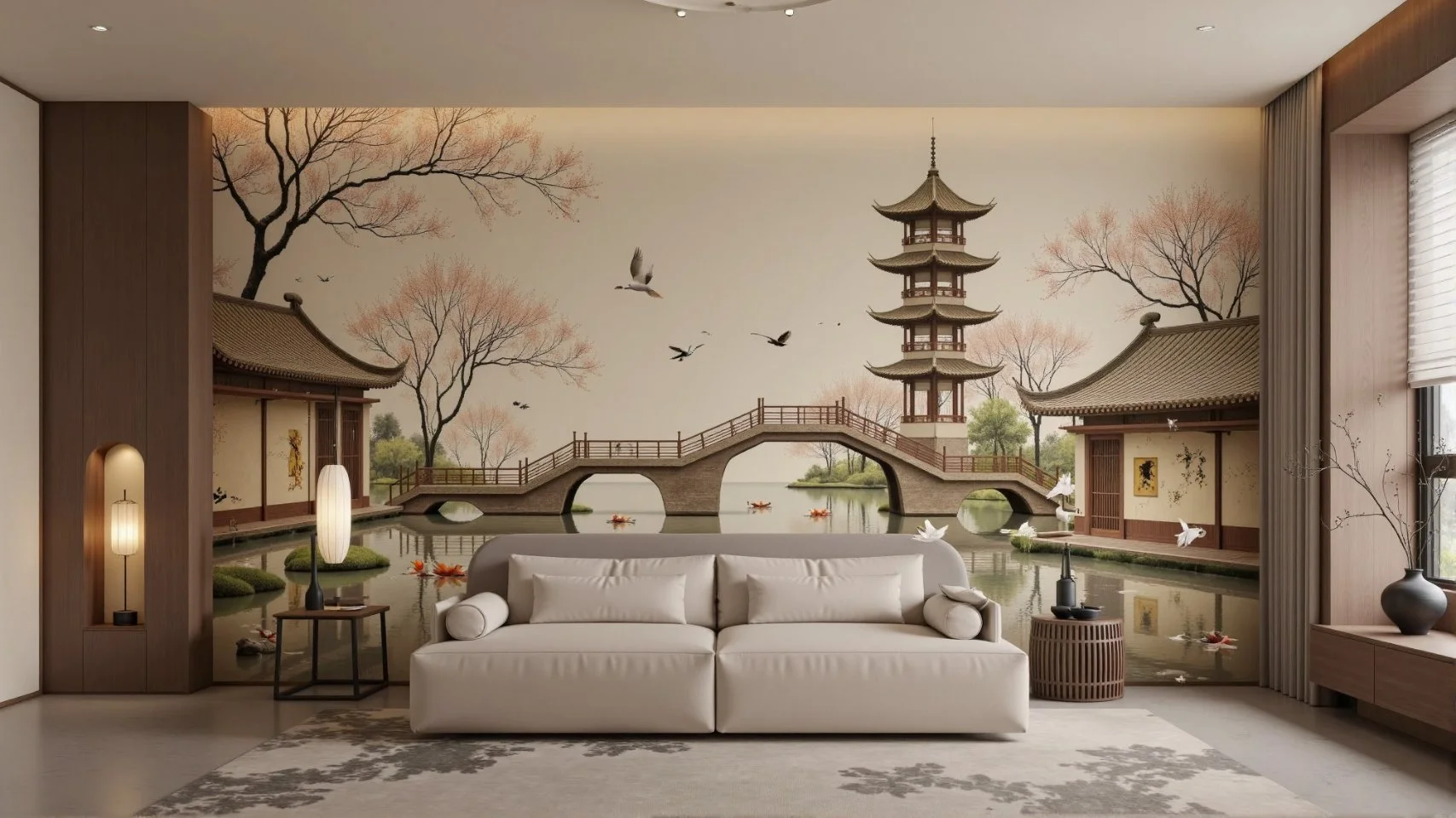 CHINOISERIE MURAL FEATURING GARDEN AND PAGODA SCENE
CHINOISERIE MURAL FEATURING GARDEN AND PAGODA SCENE
Chinoiserie also incorporates pagodas, fretwork, bridges, and imaginary landscapes—often more fantastical than authentic. Think dreamlike panoramas, not blueprints.
3. The Chinoiserie Color Palette
You might be thinking, “Isn’t Chinoiserie always blue and white?” Well, yes and no.
Blue and White: A Timeless Pair
Blue and white chinoiserie porcelain is perhaps the most iconic symbol of the style. Influenced by Chinese Qing Dynasty ceramics, European artisans created chinoiserie blue and white porcelain for centuries, mimicking those signature cobalt tones.
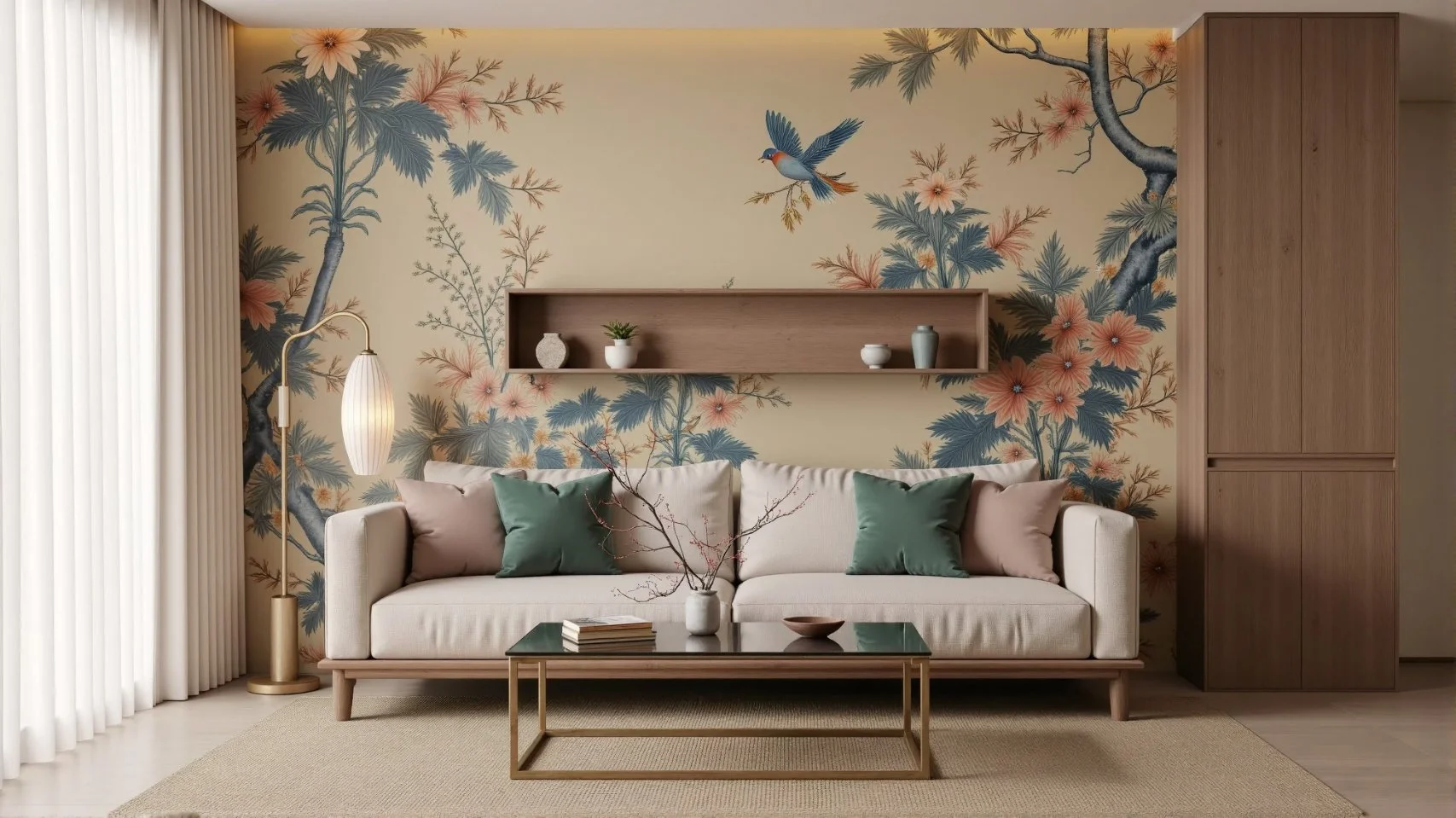 LIVING ROOM WITH CHINOISERIE WALLPAPER AND MODERN SOFA
LIVING ROOM WITH CHINOISERIE WALLPAPER AND MODERN SOFA
Other Color Stories
- Soft pastels (mint, blush, sky blue) are often found in wallpapers and fabrics
- Golds and reds dominate more opulent interpretations
- Ivory and black combinations create a bold, modern twist
Mixing and matching these colors can keep a room from feeling too one-note.
4. Chinoiserie in Home Decor
Here’s where the magic really happens. Incorporating Chinoiserie into your interior design doesn't mean turning your living room into a Versailles tea house. In fact, the modern take on Chinoiserie is all about balance.
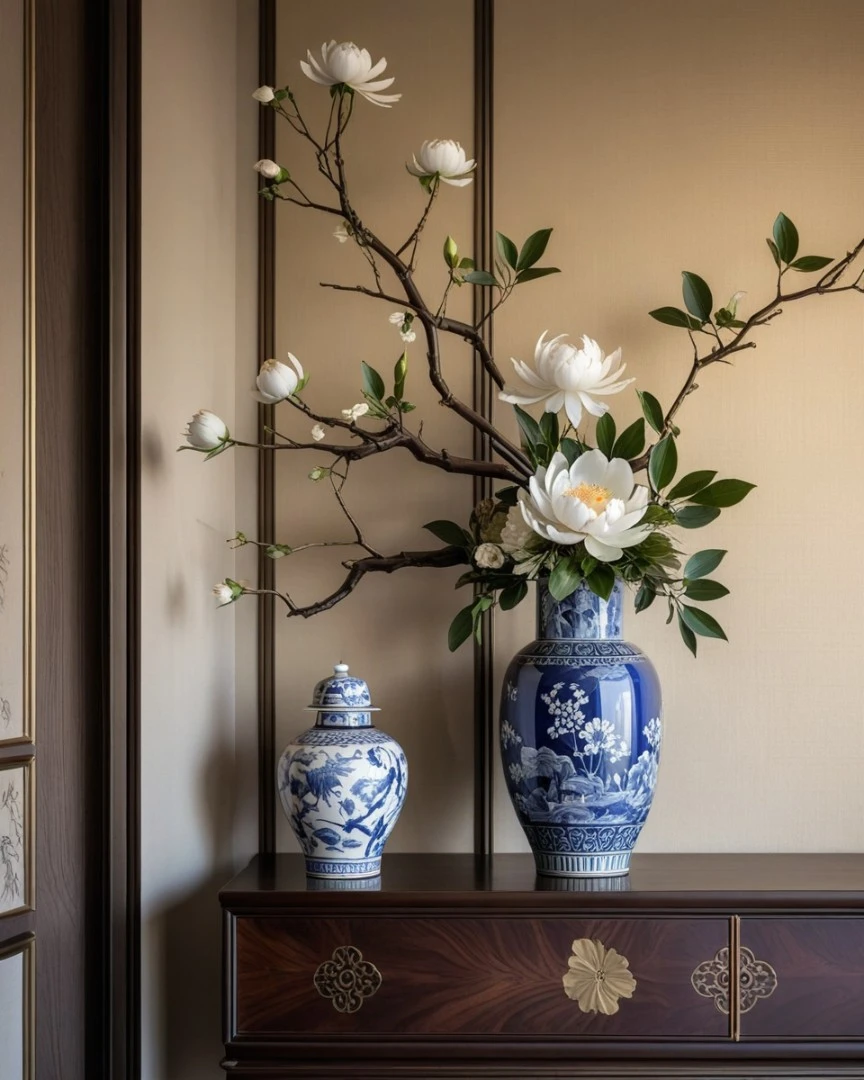 BALANCE CHINOISERIE WITH MODERN DESIGN
BALANCE CHINOISERIE WITH MODERN DESIGN
Chinoiserie Wallpaper: The Scene Stealer
When it comes to chinoiserie wallpaper, go big or go home. Whether it’s a dining room mural or an accent wall in a powder room, wallpaper with scenic hand-painted motifs adds instant sophistication.
Pro tip: Choose removable wallpaper if you're renting or non-committal.
Chinoiserie Lamps & Lighting
Chinoiserie lamps with painted ceramic bases or silk shades offer a soft, romantic glow. They're perfect for bedrooms, reading nooks, or elegant entryways.
- Look for chinoiserie table lamps in classic blue and white
- Or go bold with metallic finishes and colorful floral bases
Chinoiserie Vases & Planters
Vases are like the cherry on top. A chinoiserie vase can act as a focal point on a mantel or sideboard. Pair them with branches or peonies for an effortlessly chic arrangement.
Want to take it up a notch? Try a chinoiserie planter with a fiddle-leaf fig. That combo slaps.
5. Chinoiserie Textiles: Bedding, Curtains, and Fabric
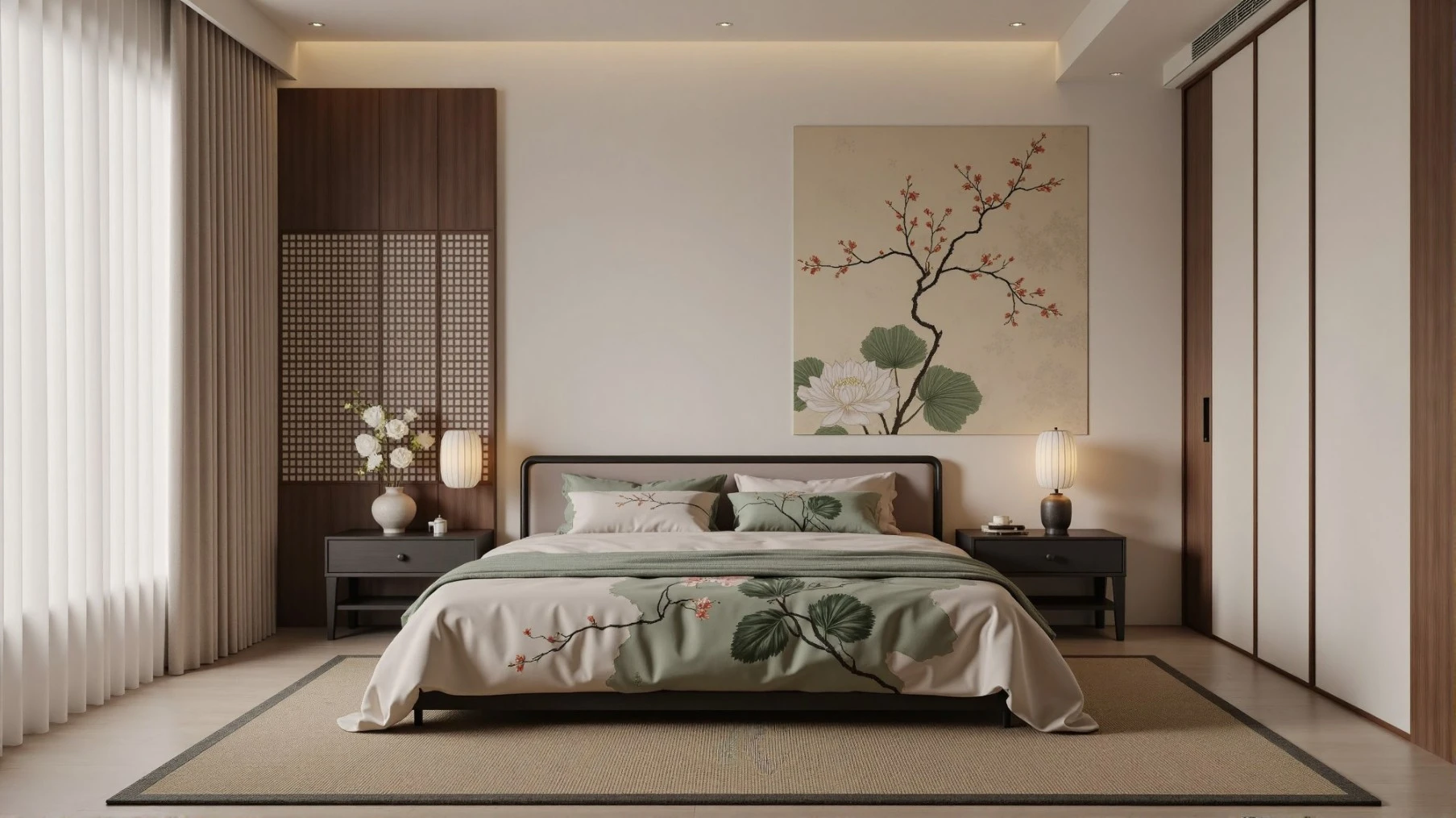 BEDROOM WITHCHINOISERIE CURTAINS AND BEDDING
BEDROOM WITHCHINOISERIE CURTAINS AND BEDDING
Your bedroom is the perfect playground for chinoiserie bedding and curtains. Here's why:
Bedding
Chinoiserie bedding often includes embroidered birds and branches on silk or satin finishes. Choose tones that complement your wall color or keep it neutral for a subtle nod to the style.
Curtains & Drapery
Chinoiserie curtains bring drama and vertical interest. Go for layered textures and oversized prints to keep things luxe, not frumpy.
Fabric Applications
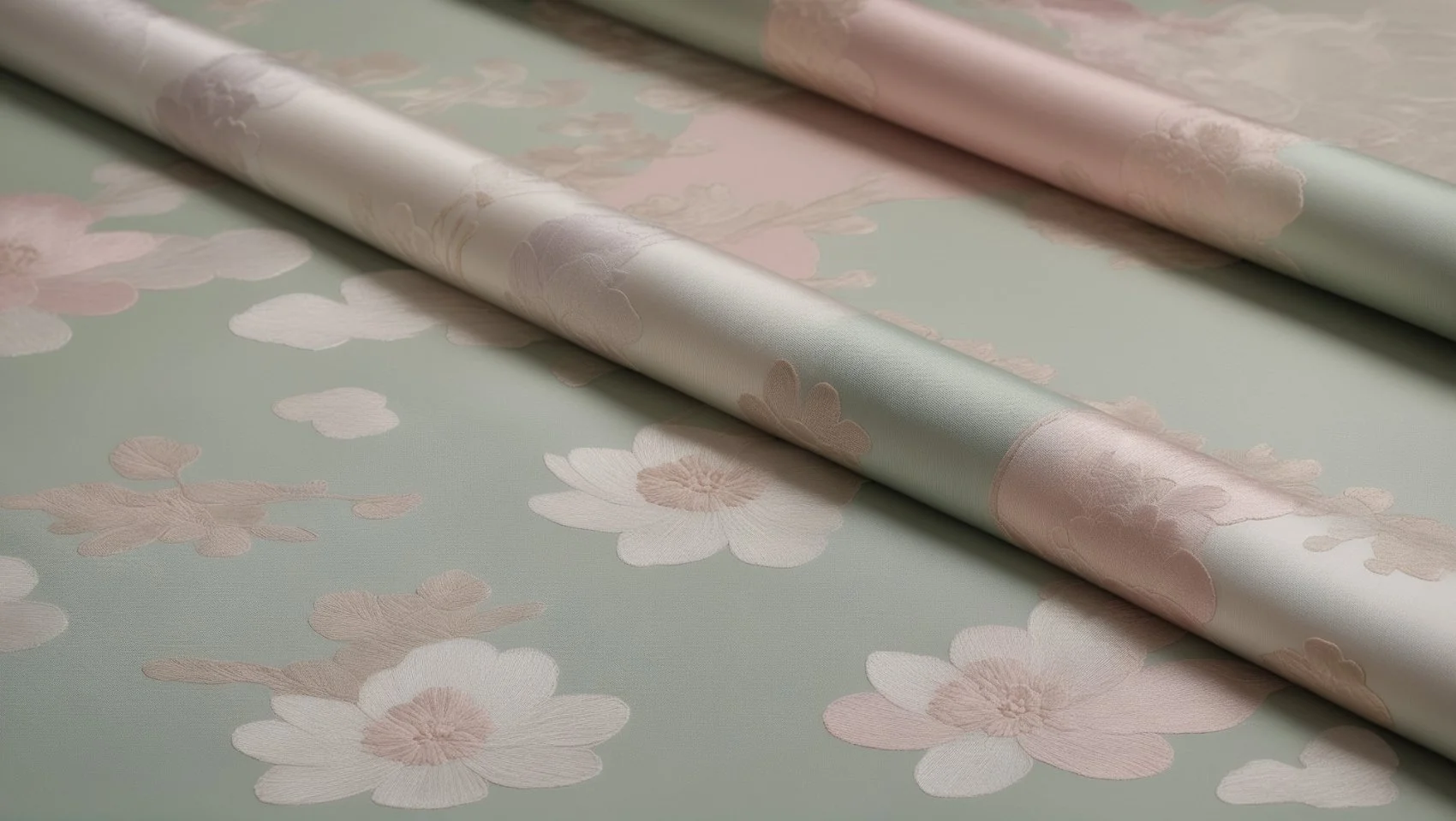 FLAT LAY OF CHINOISERIE FABRICS IN PASTEL TONES
FLAT LAY OF CHINOISERIE FABRICS IN PASTEL TONES
Chinoiserie fabric can be used for:
- Accent chairs
- Upholstered headboards
- Table skirts
- Even lampshade recoveries (yes, that’s a thing)
6. Mixing Chinoiserie with Modern Design
Think Chinoiserie is too old-school for a modern space? Think again. Designers today are integrating Chinoiserie into contemporary, minimalist, and even industrial settings.
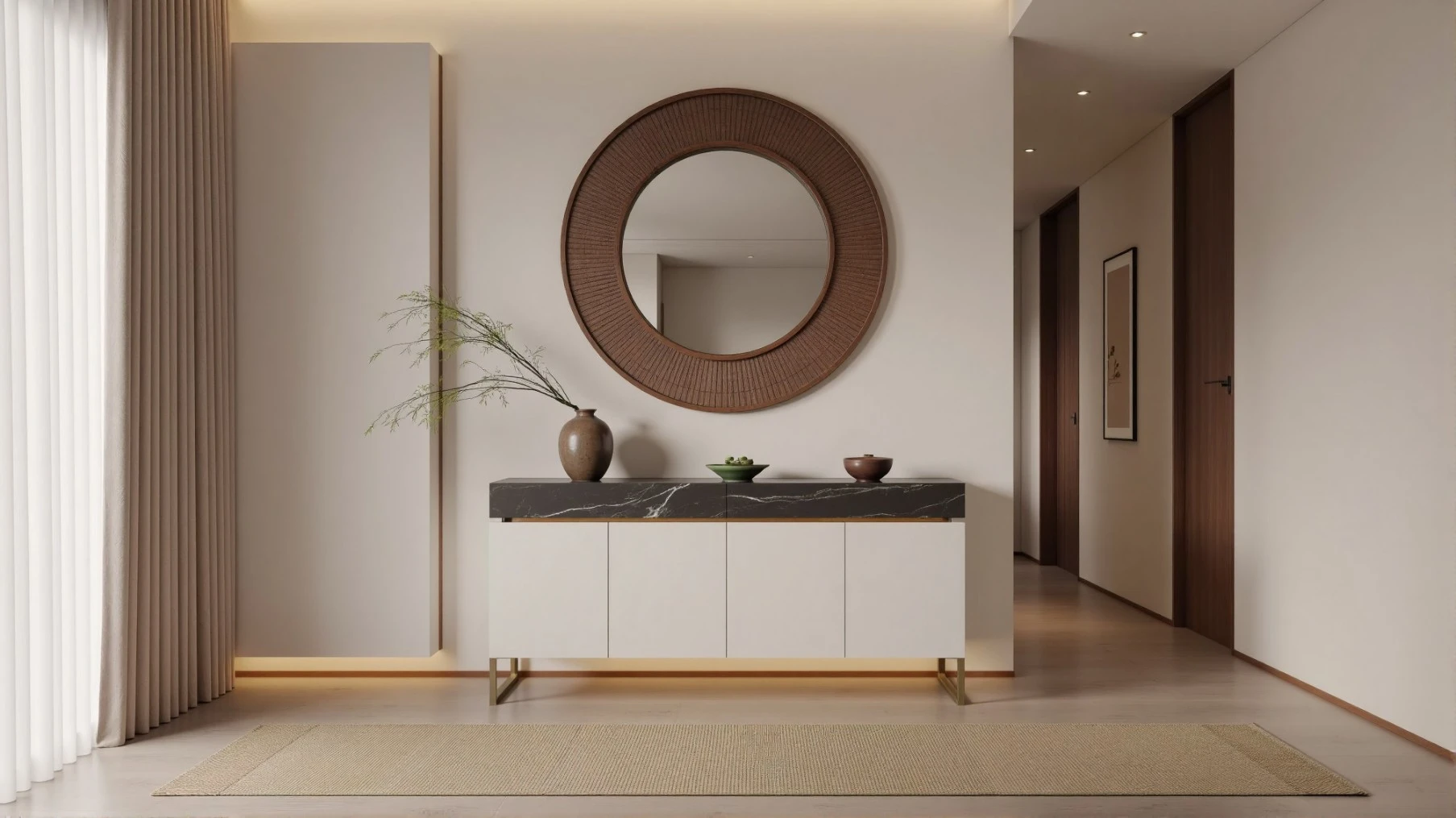 CHINOISERIE MIRROR AND MODERN CONSOLE IN ENTRYWAY
CHINOISERIE MIRROR AND MODERN CONSOLE IN ENTRYWAY
Here’s how:
- Pair a chinoiserie mirror with a concrete console table
- Use a blue chinoiserie vase on a floating shelf with neutral decor
- Hang a single chinoiserie art panel as a statement piece
The key is contrast. Let the intricacy of Chinoiserie shine against a backdrop of clean lines.
7. Where to Find Authentic or Modern Chinoiserie
You don’t have to rob a palace or break the bank.
Thrift & Vintage Shops
Sometimes, the best pieces are hiding in plain sight. Hit up estate sales or antique markets. Look for:
- Signed ceramic vases
- Silk chinoiserie fabric remnants
- Vintage lamps with pagoda shades
Modern Retailers
More and more brands are offering modern chinoiserie decor:
- Wallpaper brands like de Gournay, Gracie, and Tempaper
- Furniture retailers offering chinoiserie-inspired mirrors and dressers
- Etsy and eBay for handmade or vintage finds
8. Why Chinoiserie Still Captivates Designers Today
The truth is, chinoiserie never really left the building. In a world overrun by trends that come and go faster than you can say “cottagecore,” Chinoiserie remains a classic because it:
- Tells a story
- Evokes emotion
- Bridges cultures
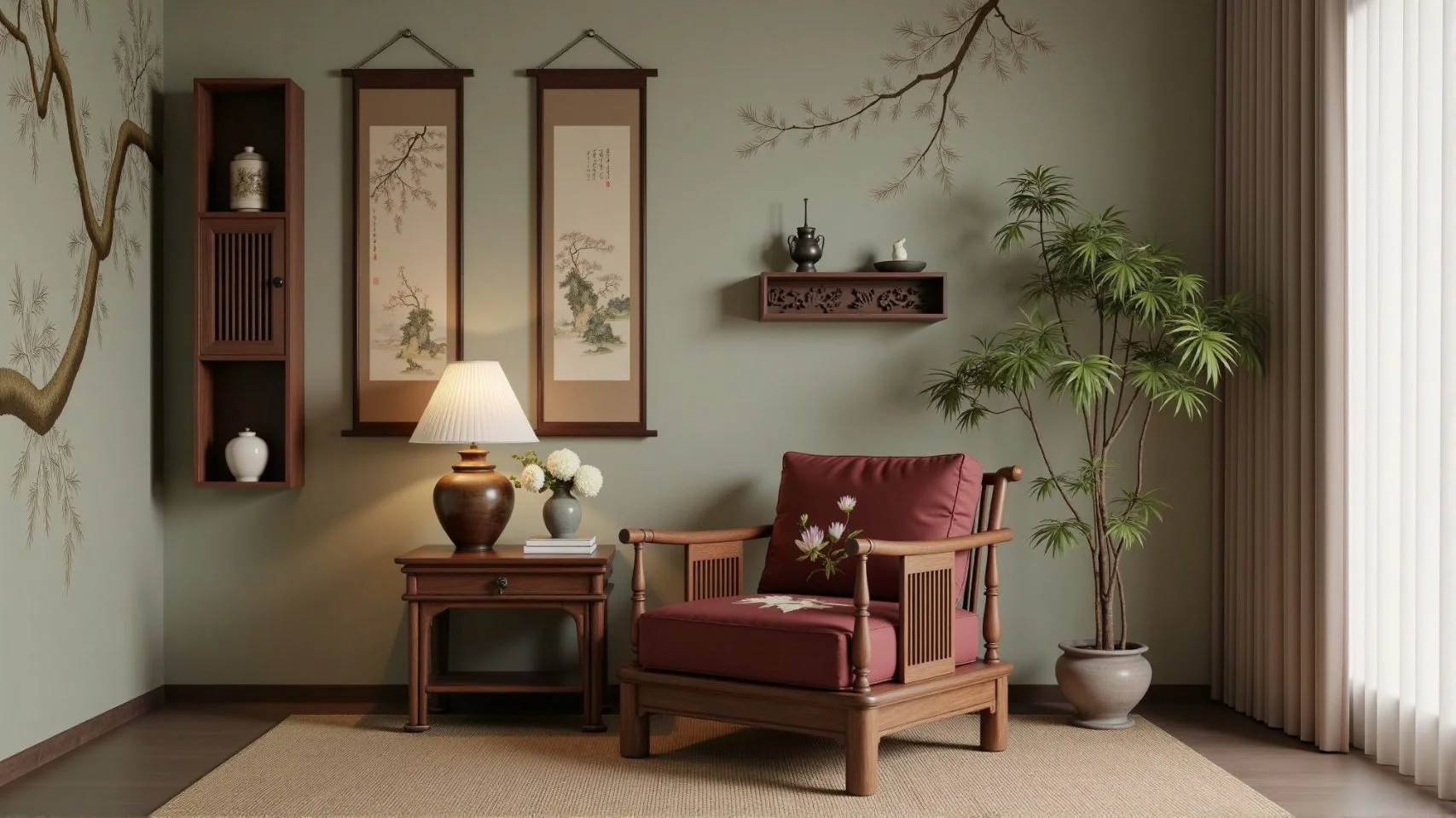 ELEGANT CHINOISERIE READING CORNER WITH ANTIQUE ACCENTS
ELEGANT CHINOISERIE READING CORNER WITH ANTIQUE ACCENTS
It’s a style that speaks in poetry, not algorithms.
So whether you're just dipping your toes in with a lamp, or going full throttle with chinoiserie wallpaper and bedding, there's a place for this dreamy, delicate, and undeniably dramatic style in your home.

